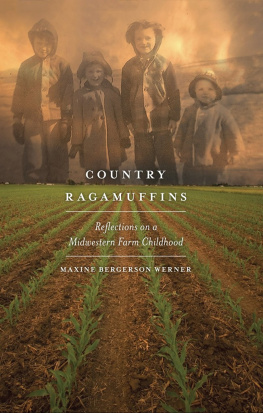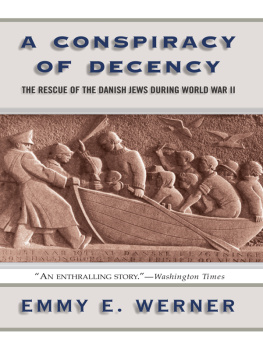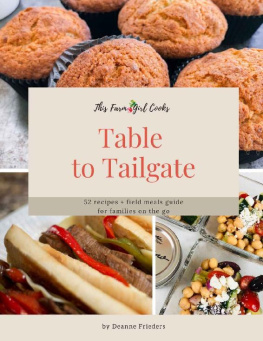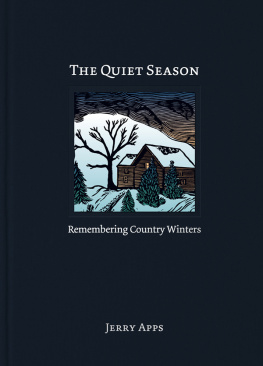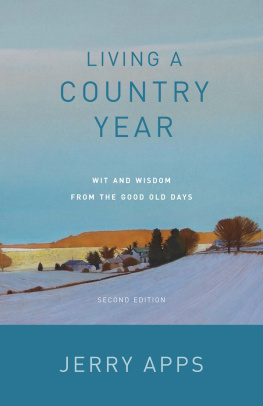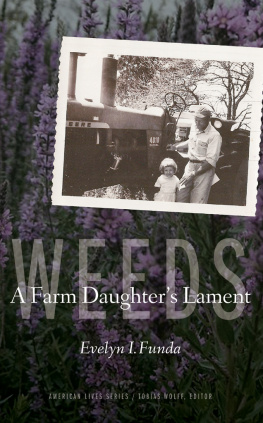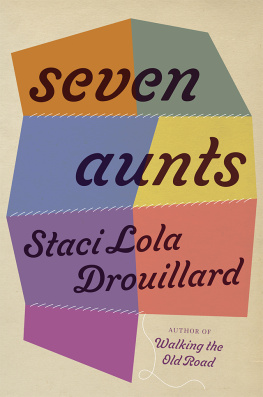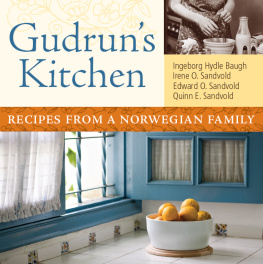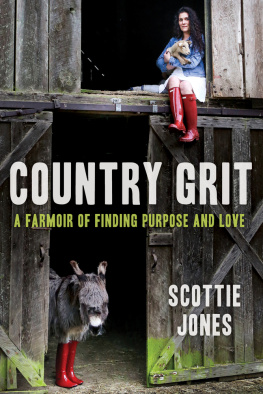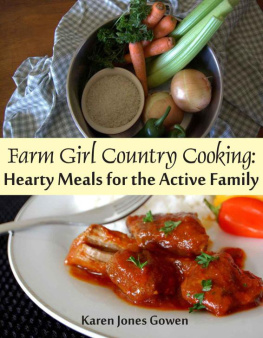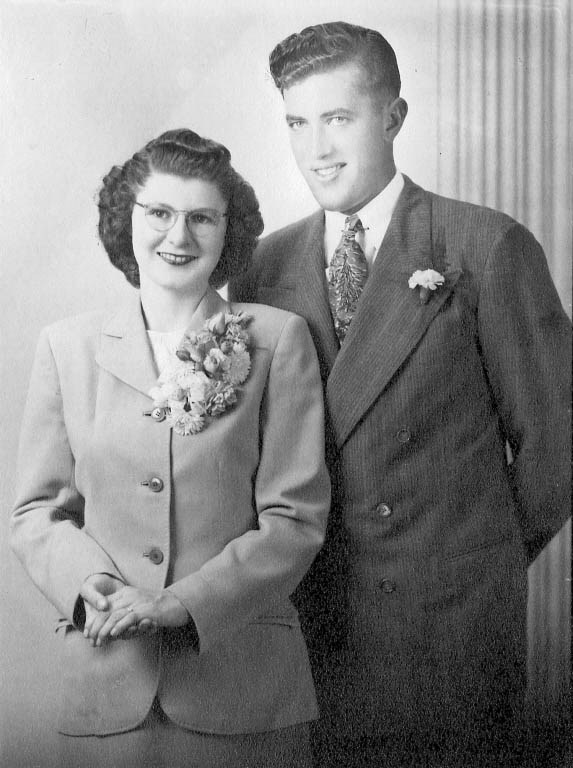All rights reserved. No part of this publication may be reproduced, stored in a retrieval system, or transmitted, in any form or by any means, electronic, mechanical, photocopying, recording, or otherwise, without the written prior permission of the author.
The land is the only thing in the world worth working for, worth fighting for, worth dying for, because its the only thing that lasts.
INTRODUCTION
Every Family Tells a Story
This book is an introspective journey back to the time of my childhood on a Minnesota farm during the 1950s and 60s. It is the story of a place and its people, who were shaped by the spirit and heritage of life in a Norwegian farming community. Change during the 1950s and 60s was pervasive and profound. A story not told is lost forever. My goal is to preserve the life experiences, attitudes, and values of my childhood before those memories grow dim and finally disappear. I hope to convey the character of a Midwestern rural community and of a typical farm family of the time.
Our grandmother, Galena Hilaria Hansel Bergerson (18981975), was a significant influence on our childhood. This is the story of a grandmother who passed along a deep appreciation of her Norwegian cultural heritage to the generations who followed.
Dad, Milton Orin Bergerson (19231983), and Mom, Madalen Jane Nagle Bergerson (19252010), grew to adulthood during two tumultuous and painful decades of war and depression. My father was born on the farm he would work and reside on for his entire life. He was raised with three brothers in a Norwegian-speaking community his grandparents had helped to settle. This is the story of my father, who transitioned from horsepower to tractor power and who never wavered in his love for the land and the independent life of a farmer.
My mother, raised in an Irish Catholic family and community in North Dakota, was disposed during World War II by the Great Northern Railway to be a depot agent in the Lutheran community of Dalton, Minnesota. Here she met and fell in love with my father. My parents married across religious boundaries of that time. As the sole Catholic in her new community, Mom reared eight children with resoluteness and determination; and with boundless energy and vitality, she worked relentlessly as a farm wife.
This is the story of eight siblings whose collective strength and work contributions played a vital part in family survival, during a time when Minnesota farm families relied heavily on children for a labor force. As sons and daughters, we contributed significantly by taking care of livestock, helping with field work, collecting eggs, cooking meals, washing clothes, and caring for our younger siblings. Raised during a generation that socialized and educated children to a gender-based division of labor, my father considered mans work inappropriate for girls. However, blessed with an abundance of girls, he had no choice but to have his daughters provide the workforce for barn chores, hauling hay, picking rock, grinding feed, and numerous other farm duties. We girls spent our time performing a wide range of domestic tasks as well as handling barn and field chores. Birth order, not gender, determined who did the mans work.
Life on the farm was a tapestry of work and play. One of our parents greatest strengths was their understanding of the benefits of play as well as work. Perhaps this was inherent for them because they enjoyed play themselves. During playtime hours, we roamed the farm, doing whatever our imaginations conceived. Living in the country, we became best friends with our siblings.
This is the story of the land of my childhood that remains in my heart. Country life cultivated in us a powerful bond with and deep appreciation for our natural world. A sense of place evolved as we experienced the serenity and rapture of the land during the four diverse seasons. The rewards of country living were momentous as we enjoyed unbridled explorations around rolling fields, pastures, and woodland.
Historically, this time and place provided the foundation for my happy childhood. I grew up during an era when the family farm and small-town living defined Minnesota rural life. Many of our experiences focused on kinship and connectedness with the local community. Friends and neighbors gave labor freely with the understanding that, eventually, the favor would be returned. Visiting with neighbors and relatives on Friday nights and Sunday afternoons were social engagements we anticipated each week.
School was a fundamental part of our lives and something we cherished. We attended a three-room country school for eight years; and for all eight years, I had the same four classmates.
I was part of the last generation that used an outhouse rather than indoor plumbing, took baths in a galvanized washtub, and slept in an unheated room upstairs. A kitchen wood stove and a dining room oil heater provided the heat for our house. We did have electricity; but we did not have a television, freezer, electric range, or electric dryer.
This is a story about things that were deeply meaningful to me: family, the blend of work and play, the beauty of the land, the sense of community, and the value of education. I can still see and hear a house filled with laughter, conversation, and debate. I can still feel the joy of celebrating holidays, seeing newborn babies coming home from the hospital, and feeling myself swaying high atop a wagonload of June hay on the way to the barn.
Writing this book was a labor of love. My brothers and sisters helped piece together the scattered recollections of years now long past. Each sibling has different memories shaped by birth order, but we all feel blessed with good family, friends and neighbors, and the natural, rural beauty we shared on the farm. Those of us who remember that era are a dying breed.
Even when I am old and gray, do not forsake me, O God, till I declare your power to the next generation, your might to all who are to come.
Psalm 71:18 (NIV)
CHAPTER 1
Norwegian Buffoonery
The second of four boys, Dad was born on the farm in 1926. His parents, Palmer and Galena, were the grandchildren of Norwegian immigrants, and Norwegian was Dads first language. At a time when many rural kids quit school after the eighth grade, Dad roomed in Fergus Falls for four years to finish high school (a distance too far to commute daily). Two sons continued to farm the land after Grandpa and Grandma retired to town; but with the modernization of equipment, two families could not make a living on this land. Dad, being the oldest son who wished to stay, received that opportunity.
Dads passion for farming came from deep within his heart. Throughout his life, he plowed, planted, and harvested corn, oats, wheat, and alfalfa, and he cared for cattle and pigs. For Dad, there was no better existence than being a farmer. He loved the rural lifestyle, farming the land, and having a strong identity in a local community.

